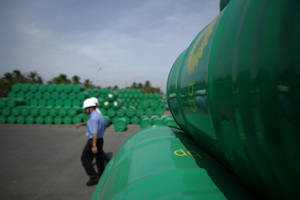BP mulling IPO of US Midwest and Gulf Coast pipeline assets
(Reuters) — BP Plc is considering an initial public offering of its vast US Midwest and Gulf Coast pipeline assets, the company said on Tuesday, a move that would raise cash.
The proposed spinoff, which would be called BP Midstream Partners, revives a plan first broached internally about five years ago before slumping crude oil prices caused the company to put the idea on hold, a person familiar with the proposal said.
BP's plan would spin off crude oil, natural gas and fuel pipelines in a master-limited partnership (MLP), a tax-advantaged structure often used by pipeline and other capital intensive companies. If it decides to go ahead with the idea, BP said it would register the subsidiary by year-end.
The company and its underwriters have retained advisors to explore the sale, the source said.
A spinoff likely would be one of the larger initial public offerings of the year, the person said, speaking on the condition of anonymity as the talks were private.
BP did not comment on the details or potential valuation of a possible transaction beyond the press release. It would own the MLP's general partner and receive all of its distribution rights, the statement said.
Several other energy companies have spun off their pipeline assets to generate capital. They include rival Royal Dutch Shell Plc, which in 2014 raised nearly $1 B in the largest MLP IPO to date, along with refiners like Valero Energy Corp, Tesoro Corp, and Marathon Petroleum Corp.
Shell was the first oil major to use this structure to generate cash from its assets. Shell's partnership has a market value of about $5.38 B. BP's pipeline network is slightly smaller than Shell's.
Previous efforts by BP to sell pipeline assets have not materialized. Last year, BP approached Enbridge Inc to sell some of BP's offshore Gulf of Mexico pipeline network, but the deal fell through, according to a person familiar with that transaction.
BP's US pipeline business includes a network of 3,500 mi of pipelines and terminal facilities that transport and store more than 1.3 MMbpd of oil, refined products and natural gas. In addition to the Gulf Coast and Midwest assets, BP operates pipelines in the Pacific Northwest. Under US tax codes, MLPs are partnerships that do not pay corporate income tax on distributions, or earnings, to partners. The partners, or owners, are responsible for paying taxes on the distributions.
BP's potential IPO of its midstream assets comes at a rough time for the US pipeline sector.
While pipeline operators derive profit from long-term contracts not linked to commodity price gyrations, the dip in oil prices in recent years has nonetheless weighed on the sector, said Tamar Essner, director of energy and utilities at Nasdaq Corporate Solutions.
"There's this perception in the market that the midstream sector is meant to be insulated from the volatility of the commodity price movement," said Essner. "But retail investors have gotten spooked by oil markets."
The price of crude oil has fallen sharply in recent months, with oil overall down nearly 14% this year. The Alerian MLP exchange-traded fund, which tracks the performance of more than two dozen midstream companies, has lost more than 4% in 2017, according to Thomson Reuters data.
Tuesday's announcement came after the market closed. BP is worth $114.8 B and its shares closed on Tuesday in London at 445.80 GBP a share.
BP is still paying down costs from the deadly 2010 Deepwater Horizon rig explosion at its Macondo well in the Gulf of Mexico in 2010. The company is set to pay up to $5.5 B in cash payments to US authorities this year as part of one settlement.
BP has sharply reduced its capital spending over the past three years in the face of a drop in oil prices, but it still requires an oil price of around $60/bbl in order to cover its costs, dividends and penalties.
The lesson for BP from Shell's experience is a master limited partnership drawing on existing assets can allow it to get cash and continuing income from its capital-intensive operations while still working closely with the asset owners.
"We prioritize our assets and maintain strategic control," said John Hollowell, chief executive of Shell Midstream Partners in an interview last month referring only to Shell's decision-making. "The key part for us is allows to have the best of both worlds. We can monetize and maintain control of the asset."
Reporting by Jessica Resnick Ault in New York, Gary McWilliams and Ernest Scheyder in Houston and Ron Bousso in London; Editing by Cynthia Osterman and David Gregorio







Comments